
When his family took the reins at Northern Sun Winery about a year and a half ago, Jonathan Bovard didn’t have any experience in the industry, but he liked wine and had what he once considered a long-shot dream.
“My introduction to alcohol was wine in Paris during the Tour de France back in [the early 2000s],” he says. “It’s always been my go-to. And then [owning a winery and a vineyard] was kind of a bucket list thing.”
After spending 30 or so years living abroad, Bovard moved to the Upper Peninsula to help his family run the Bark River winery, which was previously owned by Dave and Susan Anthony. Now, as the vineyard manager and vintner, Bovard does “everything” at Northern Sun.
Here, we get his take on some of the challenges and triumphs of growing grapes in the U.P., popular wines in his tasting room, and more.
Editor’s note: This interview has been edited for length and clarity.
Q: How did your first year, year and a half, at Northern Sun Winery go?
A: Quite honestly, having never [managed] a vineyard, you go into it with that romantic outlook of walking through the vines and picking grapes and drinking wine — that’s the romance of it. And then reality hits you and you’re like, “Oh my god, this is a lot of work.”
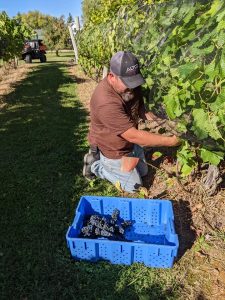
Q: Is it challenging growing grapes up in the U.P.? Are there any advantages?
A: Well, from what I read — because I haven’t grown grapes elsewhere — the biggest challenge we have here is too much moisture. In the summer, it’s quite humid. So I spend a lot of time de-leafing … to keep them from getting mold and mildew. That is the No. 1 challenge that the previous owners told me I have to really, really watch. The advantages I would say we have here is … we don’t have lots of insect issues. Last year, I only had to spray once for insects, and it was not even something I really had to had to do, but I was advised I probably should to keep it under control. So insects and stuff like that aren’t a challenge.
Q: Can you tell me about some of the wines you make, and are they primarily estate grown?
A: We are only estate grown. The only exception to that is going to be apple, honey, and [some] rhubarb. We get 50% of the rhubarb from our own garden here. The rest of it is just from neighbors, so it’s all from within the vicinity. …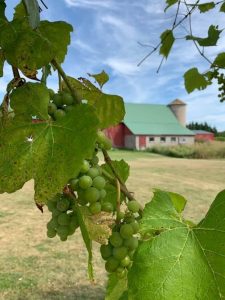
Everything we grow up here has to be cold-hardy, … so most of it comes of the Minnesota lot. So we have La Crescent, which is a white. We have Marquette, which is a red. We’ve got Brianna, which is a white. St. Pepin, which is a white. Those are the main grapes, as in multiple rows of them. And then there’s a bunch of others that I’ve got. I’ve got some Baco Noir. I’ve got some De Chaunac. … Those are just a few … that get mixed into our rosé. Our rosé is a field blend of everything else.
Q: Are there any wines that are especially popular in your tasting room?
A: The La Crescent and the Marquette are kind of our staple, our main. We really work hard to make sure those are really good. I spend a lot of time on the vine with those two in particular. The good thing is they’re extremely cold-hardy: Two weeks at negative 45 and they’ll still be fine and produce fruit the next year. … The other red I’ve got, the Léon Millot, it’s far more sensitive, so if you spend much time beyond negative 11, you’re going to struggle the next season. We’ll see. We were at minus 30 for about two weeks up here this last winter, so we’ll wait to see what happens with them. … It’s a bit sensitive, but it’s a lovely, lovely, smooth red wine.
Q: Do you make any ice wines?
A: Yes, but I didn’t this year because our summer was so weird last year — we didn’t get a frost early enough to shut the vines down. So the vines just kept going until they were pretty much rotting on the vine, and I went and called the previous owner. I was like, “We aren’t going to have anything to make an ice wine with.” And he [came] over and had a look, and he was like, “Yeah, I think we’d better go ahead and harvest these and call it a ‘late harvest’ or something.” So that’s what we did. We needed that frost early on to shut them down; otherwise, they just rot.
Q: So are the Anthonys still working with you in a mentoring role?
A: Oh yeah, for sure. Last year, they were very hands-on. This year, it’s just on request only. We’re friends anyways. They’re coming over on Saturday to my house; we’re going to do salmon and wine.
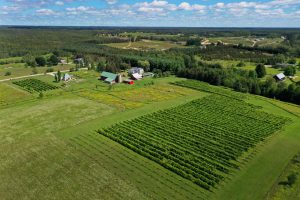
Q: Since you and your family have taken over the winery, have you been making any changes to the winery or to the tasting room?
A: Our first year was, “Let’s not change anything. Let’s just do it exactly as it is and learn every process, and then we can make any small changes we want based [on] that.” This year, [we made] a few small changes here and there, mostly just landscaping and making decisions on what we want to do as far as weed control and this and that. The tasting room, [we did] a whole revamp, actually, … so everything out, all new stands and displays, and just [gave] it a face-lift.
Q: Do you have any events or other plans at your winery that you want to share?
A: Yes, our first concert here is May 29. … It’s the second weekend of every month after that, except in August.
Q: Do you post anywhere — your website or social media — about these events?
A: Yes, we always put it up on our Facebook, and … we put them up on the website as well.




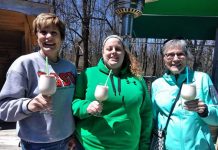
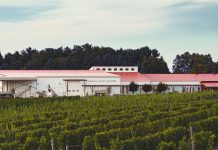
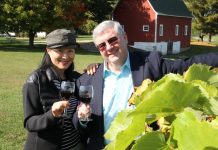





Facebook Comments